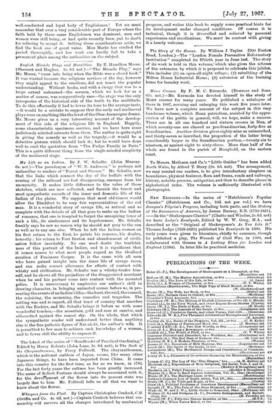My Life ds tin Indian. By J. W. Schultz. (John
Murray. 6e. net.)—The pseudonym of "W. B. Anderson" is perhaps not unfamiliar to readers of "Forest and Stream." Mr. Schultz, now that the links which connect the day of the buffalo with the coming of the railroad are fast disappearing, emerges from his anonymity. It makes little difference to the value of these sketches, which are now collected, and furnish the truest and most sympathetic records of the inner and domestic life of the Indian of the plains. We suppose that most old-timers would allow the Blackfeet to be very fair representatives of the red man. It is a wonderful story of savage life, so natural and so complete with the details of all that goes to make up the Indian of romance, that one is tempted to forget the unaspiring tenor of such a life„ its aimlessness and its hopelessness. Mr. Schultz frankly says he saw no reason why he should not pray to the sun as well as to any one else. When he left the Indian woman on his first return to the East, he paints his remorse, his doubts, honestly ; his return to Fort Bruton and abandonment of civili- sation follow inevitably. No one need doubt the truthful- ness of this portrait of the Indian, and it is significant that it comes nearer to what most people regard as the idealised creation of Fenimore Cooper. It is the same with all men who have gained insight into the inner life of savage races, and can make correct allowance for effects of contact with whisky and civilisation. Mr. Schultz was a whisky-trader him- self, and he shows all the prejudices of the disappointed merchant when he and his partner come into contact with the mounted police. It is unnecessary to emphasise our author's skill in drawing character, in bringing animated scenes before us, in pre- senting the events of an Indian's lifep—the hunt, the raid, the council, the rejoicing, the mourning, the comedies and tragedies. The setting was and is superb, all that tract of country that marches with the Rockies, and Mr. Schultz brings it before us with some wonderful touches,—the mountain, gold and rose at sunrise, and silhouetted against the sunset sky. On the whole, that which the sympathetic reader will understand better than anything else is the fine pathetic figure of Nat-ah-ki, the author's wife. It is permitted to few men to achieve such knowledge of a woman, and to fewer still the ability to express it.






































 Previous page
Previous page